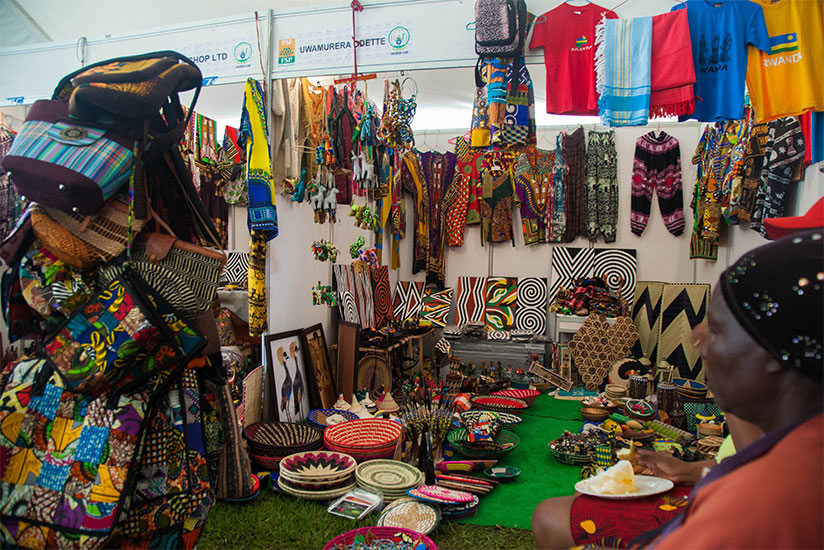Organised by the Private Sector Federation in partnership with the Government of Rwanda, the just-concluded Made-in-Rwanda Expo is the latest move toward home-grown solution to the country’s socio-economic challenges.
Held between December 14 to 20 at Gikondo Expo Grounds, the expo’s primary objective was to promote locally made products and services to boost domestic production. This would in turn stimulate local consumption habits and reduce the country’s heavy import bill.
The first edition was held at the same venue in March.
This time, some 300 exhibitors from across the country showcased their products and services in different sectors ranging from ICT, manufacturing, Agro-processing, textiles, art and crafts, hospitality and media, among others.
The exhibition sought to impact local manufacturers and consumers alike. In the case of consumers (the Rwandan public), the idea is that when more people experience first-hand what and how different products are made by fellow Rwandans at such a forum, then they realise that they too can start similar ventures.
Home-grown solution
In 2011, the Government designated Rwanda Governance Board (RGB) as custodian of the country’s home-grown solutions – development innovations that provide unconventional responses to societal challenges unlikely to be addressed through conventional means.
Because of Rwanda’s unique history, the solutions developed have been based on national heritage, historical consciousness and strife for self-reliance.
Also, these solutions seek not just to drive socio-economic development but also to promote unity, reconciliation and social cohesion.
It’s under such a context that a government oversight body like RGB was one of the exhibitors at the Made-in-Rwanda Expo.
“RGB is a public institution established to promote good governance. Our institution is also mandated to document, promote and preserve home-grown solutions under the research department,” said Jean Damascene Nkusi, from RGB, when I visited the stall.
“We have four departments; research, media coordination, civil society and NGOs, and decentralisation. Here at the expo, we’re mostly in research. In this exhibition we’re promoting home-grown solutions initiated by Rwandans to resolve Rwandan problems after the 1994 Genocide against the Tutsi. These home-grown solutions include Umuganda, Umushyikirano, Abunzi committees, Girinka, and Agaciro Development Fun. And these are trademarks that can be used for business purposes for example ‘Ndi umunyarwanda’ sweets.”
From this, it becomes obvious that the philosophy and rationale of Home Grown Solutions is intertwined with that of the Made in Rwanda mantra.
A good case in point is the Girinka (one cow per poor family) programme that primarily aims to improve the livelihoods of poor households by offering and managing dairy cows for increased milk, meat and fertiliser production.
This not only improves nutrition but also increases the earnings of beneficiaries from the sale of milk and other milk products, meat, and sale of manure.
But the programme also boosts social cohesion by passing on the first calf to another house hold.
At the RGB stand, I pick up a brochure that summarises the philosophy and rationale of homegrown solutions: “We have very high ambitions and scarce resources. Before we go out begging for things we may never get, we have to ask ourselves; have we exhausted the resources around us? This is how home grown solutions start.”
The quote is attributed to President Paul Kagame.
Textiles, art and crafts rule
By far the biggest number of exhibitors was local fashion houses, garment manufacturers and small-time art and crafts enterprises. Rwanda Clothing, Made-in-Kigali, Uzuri Fashions and Kipepepeo Kids’ Fashion were some of the more colorful (and busy stalls) in the local textiles category.
This was quite understandable. Earlier in the year, the Government announced plans ban import and sale of used garments (popularly known as chaguwa) in favour of the nascent local textile industry.
“We decided to be a part of this expo because the theme is Made-in-Rwanda and that’s what we do at Rwanda Clothing,” said Charlotte Mukashema, sales manager at Rwanda Clothing, a local fashion and clothing line that was part of the exhibition.
“The Government is currently encouraging local entrepreneurs to showcase to the public what they can do and how they do it. I was able to check out the other clothing stalls and I think some are really creative. I think we still have a long way to go but we’re trying and will definitely get there.”
Mukashema did not seem at all bothered by the relatively low turn-up of exhibition-goers.
“I would say it was really worth it. At such forums it doesn’t matter if you don’t actually make any sales, although we did. What’s important is the contacts you gain, and the feedback you get from people who may be future clients. I think that those people who didn’t come missed many things, including contacts and money.”
The next frontier
It’s still early days and therefore hard to predict where this Made-in-Rwanda mantra will lead local manufacturers, consumers and the local economy at large.
Like the old saying goes, charity begins at home, and home is where this journey in self-belief and self-determination has been launched.
The next phase will be to push Made-in-Rwanda beyond borders, and already there have been strides in that direction.
Between August 29 to September 4, the Private Sector Federation, through the Chamber of Rwanda Farmers, held a four-day exhibition aimed at finding new market opportunities for local products and identify new business opportunities and promote exports to Congo-Brazzaville.
The initiative was aimed at reducing Rwanda’s trade deficit.
The exhibition was held in Pointe-Noire, Congo-Brazzaville’s commercial capital. Rwandan traders clinched various business deals, most notably Kinazi Cassava Plant which sealed a deal to supply 104 tonnes of cassava flour per quarter (three months) to Congo-Brazzaville.
Other Made in Rwanda products that were tipped for major deals are coffee, lemon grass tea, and Made-in-Rwanda laptops.
©Alleastafrica and Newtimes



